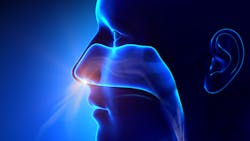What’s an airway-centric dental practice and its role in prevention?
In the world of dental hygienists, the idea of prevention is paramount. In the world of dental practice ownership, the idea of prevention is nice, but it can’t pay the bills. What if a dental practice could compliment the bottom line and prevent patients from potentially needing third molar extractions or high blood pressure medications?
Have you heard of an airway-centric practice? It means that the dentist’s focus is not on the teeth, but on the craniofacial respiratory complex, CFRC. It’s an anatomical region that dentistry shares with ear-nose-throat doctors, oral surgeons, and speech language pathologists.
Many dentists who treat snoring with mandibular advancement therapy find that their patients love it for a time, then realize that wearing the device for the rest of their lives is a tedious chore. Some patients find that their occlusion shifts, and using a repositioner every morning becomes a second chore. It’s better than a CPAP for most patients, but it does not offer permanent results.
There’s a permanent solution that is preventive when applied to children, and a treatment with an endpoint when applied to adults. Appliances that develop the arch for children is a first option if a child is young enough. Dentists can also develop the arch of adults. The science has not caught up as to why this happens, but traditionalists insist that the suture will not respond in a person after their teens. Today’s device doesn’t tip the teeth to make more room for the tongue; it stimulates bone growth along the palatal suture line to create true expansion of the palate and floor of the sinus.
Dr. David Singh developed the arch development device that has gained major traction the last five years. Its name changed from the DNA device to Vivos Therapeutics.
What the device does
We know that sleep apnea in adults leads to many health problems. But after a few weeks of wearing Vivos Therapeutics, patients notice many improvements to their sleep, snoring, blood pressure, headaches, and migraines. Another important point is the permanence. Patients who use CPAP will not get better scores on a second sleep study unless they wear their device during the test. Those experiencing arch development retain better scores even after graduating from the Vivos Therapeutics device.
The patented design is split along the lines of the median palatine and incisive suture lines. Screws are inserted along the splits where a patient can widen the separation at prescribed times. What makes the design of the Vivos different from other expanders are the embedded springs. Adding springs to the device in strategic locations activates the growth in a more predictable way, not pressing the teeth out of the buccal plate but encouraging growth from the median suture. The bony growth will not ungrow.
Dentists who focus on providing frenuloplasty for adult patients have found that releasing the tongue into a narrow palate does not provide the solution they seeked. This is the same for patients who have undergone orthodontic-requested removal of the premolars. For the tongue to rest outside the oropharynx in the oral cavity, the palate needs to be wide enough to accommodate the entire adult tongue. If the tongue has never been in the palate, as in a child with an untreated tongue restriction, there’s likely no room for it. This is where adult arch development can help reduce obstructive sleep apnea.
Vivos Therapeutics was named a Top 10 Most Innovative Company by Fast Company. Vivos Therapeutics also won FDA 510(k) clearance as a Class II device, giving rise to a new treatment regimen for mild-to-moderate obstructive sleep apnea.
Some dentists now focus exclusively on developing the airway, from the sinuses to the larynx, by using this device that supports growth to express the entire genetic potential of the individual. They work together with orofacial myofunctional therapists and frenuloplasty doctors to fully optimize the CFRC.
Results from patients who undergo arch development as an adult1
- 28% had their OSA resolved.
- 63% improved by one AHI classification (i.e., severe to moderate, moderate to mild, or mild to no OSA).
- 86% improved their airway size.
- 97% increased the width of their palate, which allows the tongue to rest in proper position, thus avoiding a potential airway obstruction.
- In a study of patient satisfaction with arch development, 97% achieved their desired outcome, and 98% were highly or very satisfied and were likely to recommend the treatment to a friend.
Editor's note: This article appeared in the May 2023 print edition of Dental Economics magazine. Dentists in North America are eligible for a complimentary print subscription. Sign up here.
Editor's note: Vivos is a recent financial supporter of Dental Economics.
Reference
- Vivos Therapeutics Inc. Vivos Therapeutics receives FDA 510(k) clearance of its flagship DNA oral appliance for treatment of obstructive sleep apnea. Globe Newswire. January 4, 2023. Accessed March 30, 2023. https://www.globenewswire.com/news-release/2023/01/04/2582808/0/en/Vivos-Therapeutics-Receives-FDA-510-k-Clearance-of-its-Flagship-DNA-Oral-Appliance-for-Treatment-of-Obstructive-Sleep-Apnea.html
- 30 assessment and therapies for sleep and sleep-related breathing disorders associated with atopic disease in children: a dental perspective–scientific figure on ResearchGate. Accessed March 30, 2023. https://www.researchgate.net/figure/The-craniofacial-respiratory-complex-from-garg-et-al-33-with-permission_fig1_333902862
Results from patients who undergo arch development as an adult1
- 28% had their OSA resolved.
- 63% improved by one AHI classification (i.e., severe to moderate, moderate to mild, or mild to no OSA).
- 86% improved their airway size.
- 97% increased the width of their palate, which allows the tongue to rest in proper position, thus avoiding a potential airway obstruction.
- In a study of patient satisfaction with arch development, 97% achieved their desired outcome, and 98% were highly or very satisfied and were likely to recommend the treatment to a friend.
About the Author

Shirley Gutkowski, BSDH, RDH
Shirley Gutkowski, BSDH, RDH, is the owner and primary practitioner at Primal Air LLC, located in Sun Prairie, Wisconsin. She and her team of RDH OMTs see most of their patients online. Primal Air is a three-part practice that not only serves the needs of patients but also gives OMT-trained RDHs a place to learn and practice the science of OMT. Gutkowski can be reached at [email protected].
